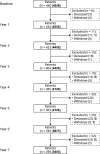Association of GBA Genotype With Motor and Functional Decline in Patients With Newly Diagnosed Parkinson Disease
- PMID: 33443131
- PMCID: PMC8055329
- DOI: 10.1212/WNL.0000000000011411
Association of GBA Genotype With Motor and Functional Decline in Patients With Newly Diagnosed Parkinson Disease
Abstract
Objective: To establish the significance of glucocerebrosidase gene (GBA) carrier status on motor impairment in a large cohort of patients with incident Parkinson disease (PD).
Methods: Three European population-based studies followed 528 patients with PD from diagnosis. A total of 440 with genomic DNA from baseline were assessed for GBA variants. We evaluated motor and functional impairment annually using the Unified Parkinson's Disease Rating Scale (UPDRS) motor and activities of daily living (ADL) sections. Differential effects of classes of GBA variants on disease progression were evaluated using mixed random and fixed effects models.
Results: A total of 387 patients with idiopathic disease (age at baseline 70.3 ± 9.5 years; 60.2% male) and 53 GBA carriers (age at baseline 66.8 ± 10.1 years; 64.2% male) were included. The motor profile of the groups was clinically indistinguishable at diagnosis. GBA carriers showed faster annual increase in UPDRS scores measuring ADL (1.5 point per year, 95% confidence interval [CI] 1.1-2.0) and motor symptoms (2.2 points per year, 95% CI 1.3-3.1) compared to noncarriers (ADL, 1.0 point per year, 95% CI 0.9-1.1, p = 0.003; motor, 1.3 point per year, 95% CI 1.1-1.6, p = 0.007). Simulations of clinical trial designs showed that recruiting only GBA carriers can reduce trial size by up to 65% compared to a trial recruiting all patients with PD.
Conclusion: GBA variants are linked to a more aggressive motor disease course over 7 years from diagnosis in patients with PD. A better understanding of PD progression in genetic subpopulations may improve disease management and has direct implications for improving the design of clinical trials.
Copyright © 2020 The Author(s). Published by Wolters Kluwer Health, Inc. on behalf of the American Academy of Neurology.
Figures



References
-
- Winder-Rhodes SE, Evans JR, Ban M, et al. . Glucocerebrosidase mutations influence the natural history of Parkinson's disease in a community-based incident cohort. Brain 2013;136:392–399. - PubMed
-
- Lunde KA, Chung J, Dalen I, et al. . Association of glucocerebrosidase polymorphisms and mutations with dementia in incident Parkinson's disease. Alzheimers Dement 2018;14:1293–1301. - PubMed
Publication types
MeSH terms
Substances
Grants and funding
LinkOut - more resources
Full Text Sources
Medical
